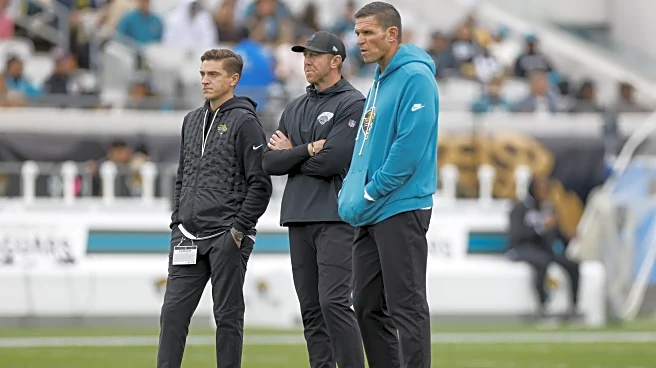What's Happening?
The film adaptation of Stephen King's novel 'The Long Walk' presents a dystopian United States where 100 teenage boys are selected to participate in a deadly contest. Directed by Francis Lawrence, known for 'The Hunger Games' series, the movie follows the boys as they endure physical and emotional degradation during a multiday walk. The contest, under totalitarian rule, offers a monetary prize to the sole survivor, with dire consequences for slowing down. The film stars Cooper Hoffman and David Jonsson as Ray and Pete, who form a bond amidst the brutal conditions. The narrative critiques the extreme outcomes of American capitalism and the consumption of destruction as entertainment.
Why It's Important?
The adaptation of 'The Long Walk' serves as a scathing critique of societal norms and the desensitization to violence. It highlights the exploitation of youth and the normalization of brutality as entertainment, drawing parallels to real-world issues such as mass shootings. The film's portrayal of organized barbarism reflects on the pressures faced by young people in a capitalist society. It raises questions about the ethical implications of such contests and the impact on mental health and societal values. The movie challenges viewers to consider the consequences of power abuses and the role of media in shaping perceptions.
What's Next?
The film's release may spark discussions on the portrayal of violence in media and its effects on audiences. It could lead to debates on the ethical responsibilities of filmmakers in depicting graphic content. The adaptation might influence future projects exploring similar themes, encouraging filmmakers to address societal issues with sensitivity. Audience reactions and critiques could shape the narrative around dystopian storytelling and its relevance to contemporary issues. The film's impact on young viewers and its reception in the context of current events may drive conversations on media consumption and societal change.
Beyond the Headlines
The adaptation of 'The Long Walk' delves into deeper themes of desensitization to violence and the ethical implications of entertainment. It explores the psychological impact on participants and viewers, questioning the morality of such contests. The film's narrative challenges societal norms and the acceptance of brutality, urging audiences to reflect on their role in consuming violent content. It highlights the need for critical thinking and empathy in addressing societal issues, emphasizing the importance of understanding the human cost of entertainment. The movie's portrayal of dystopian themes may influence cultural perceptions and inspire discussions on ethical storytelling.









